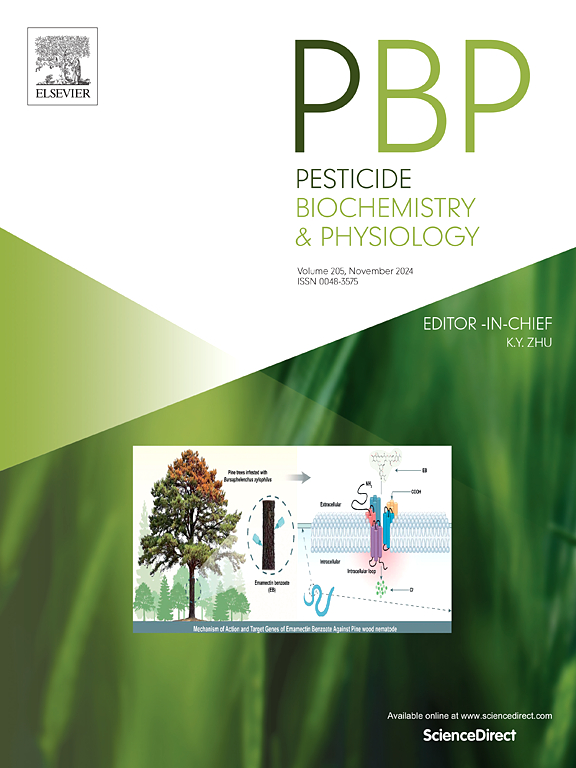Protective effects of resveratrol on honeybee health: Mitigating pesticide-induced oxidative stress and enhancing detoxification
IF 4.2
1区 农林科学
Q2 BIOCHEMISTRY & MOLECULAR BIOLOGY
引用次数: 0
Abstract
The widespread use of pesticides poses a significant threat to honeybee health by impacting their survival, behavior, immune function, and detoxification capacity. While phytochemicals such as resveratrol (RSV) have shown potential in mitigating oxidative stress and enhancing antioxidant defenses, their role in improving honeybee tolerance to pesticide exposure remains underexplored. In this study, we investigated the effects of RSV supplementation on honeybees exposed to three pesticides: dinotefuran (DIN), tebuconazole (TEB), and deltamethrin (DEL). The results showed that RSV supplementation significantly improved survival, feed intake, mobility, and gustatory sensitivity, indicating its protective effects against pesticide toxicity. Furthermore, RSV helped normalize impaired detoxification enzyme activities, including SOD, POD, catalase, and glutathione reductase, and reduced ROS levels and lipid peroxidation. Gene expression analysis revealed that RSV modulates Toll pathway-related genes like defensin and apidaecin, alleviating immune suppression caused by pesticides. Additionally, RSV influenced the insulin/insulin-like growth factor signaling (IIS) pathway by reducing ilp1 and inr1 expression, potentially mitigating metabolic stress. These findings demonstrate that protective effects of RSV may be linked to its ability to counter oxidative stress, restore mitochondrial function, and enhance energy metabolism. Furthermore, RSV is widely available, cost-effective, and easily incorporated into bee feed, making it feasible for large-scale application. This study highlights the protective role of RSV in pesticide detoxification in honeybees, offering new perspectives for honeybee health management and environmental toxicology research. By reducing the adverse effects of pesticides on honeybees, the application of RSV not only contributes to maintaining ecological balance but also supports sustainable agricultural practices. Future research should focus on optimizing its dosage, evaluating long-term effects, and investigating its impact on colony dynamics to facilitate its practical implementation in apiculture.

白藜芦醇对蜜蜂健康的保护作用:减轻农药引起的氧化应激和增强解毒作用
农药的广泛使用通过影响蜜蜂的生存、行为、免疫功能和解毒能力,对蜜蜂的健康构成了重大威胁。虽然植物化学物质如白藜芦醇(RSV)已显示出减轻氧化应激和增强抗氧化防御的潜力,但它们在提高蜜蜂对农药暴露耐受性方面的作用仍未得到充分研究。在这项研究中,我们研究了RSV补充对暴露于三种农药的蜜蜂的影响:敌敌畏(DIN),戊康唑(TEB)和溴氰菊酯(DEL)。结果表明,添加RSV显著提高了成活率、采食量、流动性和味觉敏感性,说明RSV对农药毒性具有保护作用。此外,RSV有助于使受损的解毒酶活性正常化,包括SOD、POD、过氧化氢酶和谷胱甘肽还原酶,并降低ROS水平和脂质过氧化。基因表达分析显示,RSV通过调节Toll通路相关基因如防御素和apidaecin,缓解农药引起的免疫抑制。此外,RSV通过降低ilp1和inr1表达影响胰岛素/胰岛素样生长因子信号通路,可能减轻代谢应激。这些发现表明,RSV的保护作用可能与其对抗氧化应激、恢复线粒体功能和增强能量代谢的能力有关。此外,RSV可广泛获得,具有成本效益,并且易于添加到蜜蜂饲料中,因此可以大规模应用。本研究突出了RSV在蜜蜂农药解毒中的保护作用,为蜜蜂健康管理和环境毒理学研究提供了新的视角。通过减少农药对蜜蜂的不良影响,RSV的应用不仅有助于维持生态平衡,而且支持可持续的农业实践。未来的研究应集中在优化其用量、评估其长期效应、研究其对蜂群动力学的影响等方面,以促进其在蜜蜂养殖中的实际应用。
本文章由计算机程序翻译,如有差异,请以英文原文为准。
求助全文
约1分钟内获得全文
求助全文
来源期刊
CiteScore
7.00
自引率
8.50%
发文量
238
审稿时长
4.2 months
期刊介绍:
Pesticide Biochemistry and Physiology publishes original scientific articles pertaining to the mode of action of plant protection agents such as insecticides, fungicides, herbicides, and similar compounds, including nonlethal pest control agents, biosynthesis of pheromones, hormones, and plant resistance agents. Manuscripts may include a biochemical, physiological, or molecular study for an understanding of comparative toxicology or selective toxicity of both target and nontarget organisms. Particular interest will be given to studies on the molecular biology of pest control, toxicology, and pesticide resistance.
Research Areas Emphasized Include the Biochemistry and Physiology of:
• Comparative toxicity
• Mode of action
• Pathophysiology
• Plant growth regulators
• Resistance
• Other effects of pesticides on both parasites and hosts.

 求助内容:
求助内容: 应助结果提醒方式:
应助结果提醒方式:


